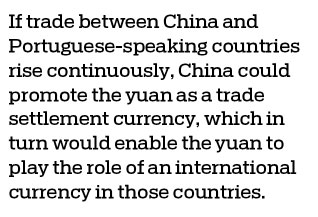Macao can play the role of an ideal offshore yuan center
The yuan has become the world's fifth-largest payment currency, third-largest currency for settling trade deals, eighth-largest foreign exchange currency and sixth-largest reserve currency. More than 60 countries' central banks or monetary authorities have incorporated the yuan in their foreign exchange reserves. Over 320,000 enterprises and more than 270 banks have launched cross-border yuan businesses, and 242 countries and regions have established cross-border yuan receipt and payment business with China. Which means the yuan's internationalization process is moving forward steadily.
But since the United States' trade war against China and the violent protests in the Hong Kong Special Administrative Region have affected the yuan's internationalization process, China has to build more stable offshore centers to facilitate its internationalization. For example, China could use the advantages of the Macao Special Administrative Region's offshore financial center to build an offshore yuan center and explore business in the Portuguese-speaking countries.

The cumulative population of the eight Portuguese-speaking countries that have diplomatic relations with China is more than 260 million while their total GDP is about $2 trillion. And in 2018, trade between China and Portuguese-speaking countries was worth $147.3 billion.















